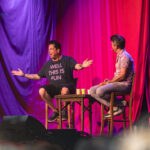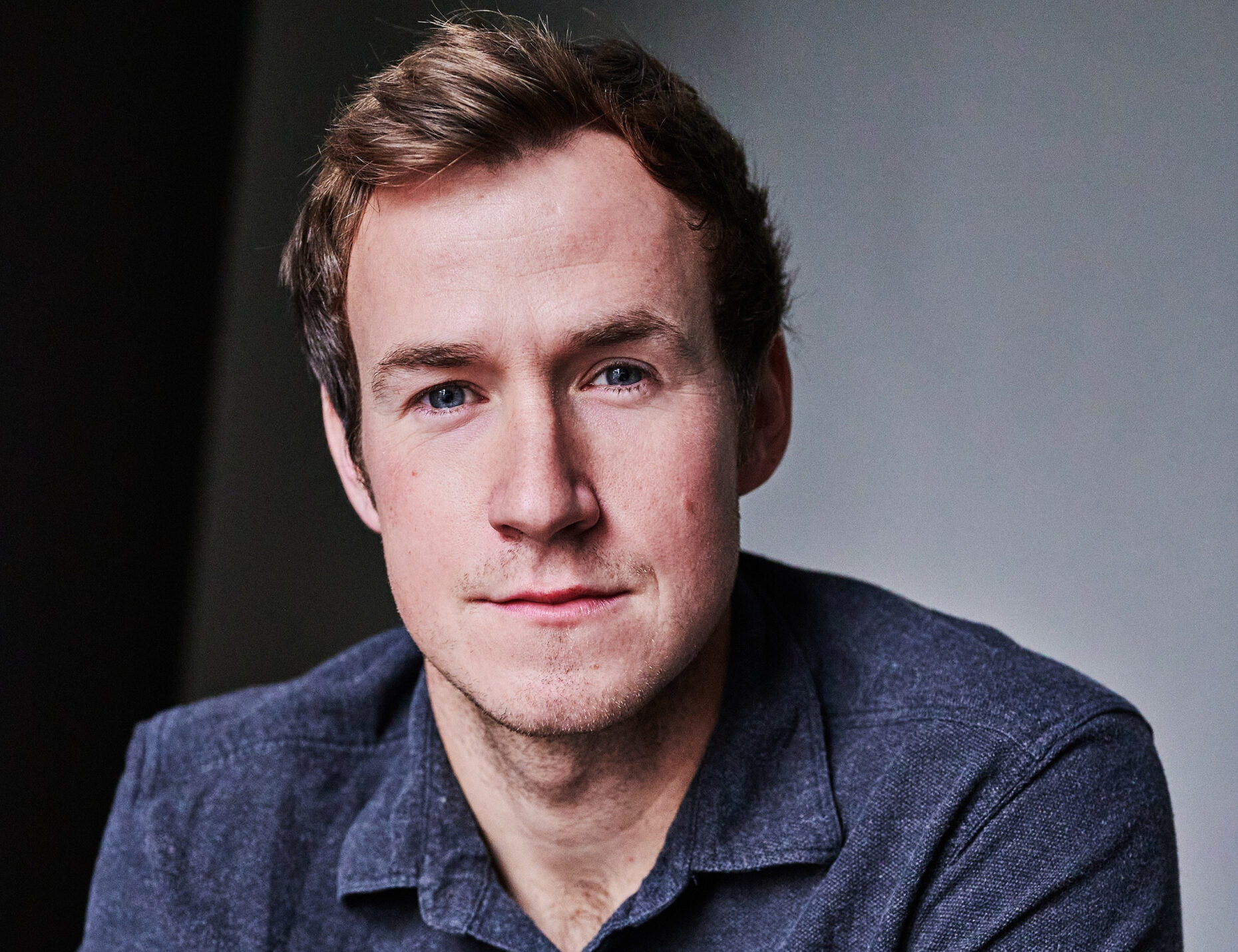by Jim Keaveney.
The Jamie Lloyd Company is bringing The Seagull, Chekhov’s tale of love and loneliness, back to the West End, two years after it was forced to cancel the production during previews due to the first lockdown. It opens at the Harold Pinter Theatre tomorrow night.
A young woman is desperate for fame and a way out. A young man is pining after the woman of his dreams. A successful writer longs for a sense of achievement. An actress wants to fight the changing of the times. In an isolated home in the countryside where dreams are in tatters, hopes dashed, hearts broken and there is nowhere left to turn, the only option is to turn on each other.
Sophie Wu plays Masha as part of a stellar cast that includes Emilia Clarke, Indira Varma, Robert Glenister, Tom Rhys Harries and Daniel Monks. Wu has made a name for herself in the Kick-Ass film series and the Channel 4 series Fresh Meat. But she is also an accomplished stage actor and playwright.
We caught up with Wu during tech rehearsals to talk about the production, tapping into her own personality, and balancing family life and theatre.
 |
| Sophie Wu in rehearsals for The Seagull. Photo: Marc Brenner |
The Understudy interview with Sophie Wu
Thanks for speaking with me about The Seagull. How have preparations been so far?
It’s been going really well. The hours have been quite nice. We do 11:30am til 4:30pm and we have a very short break. So you work quite intensely, which I think is quite good for focus.
You’re playing Masha; I’m assuming you can’t give too much away but are you approaching the character?
I feel like everyone’s been cast in characters [where] they already have qualities within them already. I feel that Jamie’s (director Jamie Lloyd) always encouraging us to use aspects of our own personality in the character themselves. With Masha, I feel like I can access being, sort of, depressed, and she’s quite acerbic and one-note, sometimes, in the way she talks to people. So I feel like those are things I can access within myself already, quite easily. And the production’s quite naturalistic; we’re all mic’d so you don’t have to vocally push too much. So it’s almost like you’re doing film or television, but on the stage, which is quite nice, because it means you can be quite small and insular. It’s all quite internal, which you can’t often be in a big West End production – which is quite nice.
Quite similar to Jamie’s production of Cyrano de Bergerac, then?
Yeah, it’s definitely got similar vibes.
 |
| Sophie Wu in rehearsals for The Seagull. Photo: Marc Brenner |
Given what you’ve said about tapping into part of your own personality, do you feel a real parallel between Masha and yourself?
Everyone’s probably experienced unrequited love at some point in their life. And certainly [I’ve got a] good old wealth of misery aside myself for that. And I think there’s definitely parallels. I don’t know why but I do enjoy playing depressed bitter people, which she is… I mean, she’s not; she’s also very cruel to Medvedenko, who’s in love with her. And I quite enjoy playing that aspect, not just of her being lovelorn and sad, but also her just being a real bitch to Medvedenko. So I feel like I’ve also got reserves of bitch in me
Is it cathartic to get that out?
Haha, I love it. Like, weirdly love it… and I hope it’s not too psycho-esque to enjoy it but I do
You’re part of a stellar cast and you’re working with creatives like Jamie Lloyd, what’s it like being part of that group?
It’s amazing, I feel incredibly lucky to be going to work with these people every day. And not only are they amazing actors, but they’re also just very lovely people as well. So it’s a very nice relaxed company of actors. There’s no one horrendous, you know, there always is generally someone in a company.
There’s always one…
There’s always one and when there isn’t one, you probably think it’s yourself! But genuinely everyone’s really nice, very relaxed. It’s a very nice atmosphere in the rehearsal room. It’s not been stressful so far, which I think at this stage. I think Jamie’s quite good at creating quite a relaxed atmosphere.
You mentioned the approach is almost like film or television and, obviously, you’ve done blockbuster films and TV shows as well as major theatre. Is that variety important? Do you prefer one medium over another?
I like the variety. And definitely recently, I’ve done a lot more theatre than I have done film or television. It’s dependent on the role, how much you enjoy something more than [the medium]. I really love the character of Masha so I’m enjoying it for the character more than anything else. But I think variety is always good. I wouldn’t sort of want to just stick to one, I don’t think.
 |
| Sophie Wu (left) in rehearsals for The Seagull. Photo: Marc Brenner. |
You’re approaching the point where you were two years ago when you, unfortunately, had to close during previews. Does it feel different this time? Have you approached things differently?
Weirdly, in between the first time we did it and now I’ve had a baby. So it feels like it’s been quite a big change. [It’s my second one], so it’s not been as much of a shock to the system as the first one. That’s obviously been a massive shift in my life. And I thought, I’d feel completely different but, weirdly, it feels exactly like I’ve just gone back in time; it doesn’t feel massively different. We’ve got some new cast members, and that’s been quite nice. Not that I didn’t like the old cast members! But it’s just made it feel slightly different. So you’re not going in thinking you’re just redoing exactly the same show again; it’s actually changed a lot since the first time we did it, in terms of the stage and we don’t have props, for example. And there’s been some quite hefty cuts. So it’s a lot shorter, which is good for everyone.
You can get home earlier!
Genuinely, so happy with that!
How is it balancing that home life and acting?
It is quite hard emotionally and also logistically because you end up just having to spend so much money on childcare. And also, you know, doing a show in the evening, coming home late and then having to get up really early in the morning. It’s not ideal, but it’s doable. And because it’s only for three months, you think you can handle it, but it’s definitely difficult.
You’ve written a couple of plays that have played at the Bush Theatre and Soho Theatre, as well as at Edinburgh Fringe. Has that changed how you’ve approached acting at all?
I think when I read scripts now, I feel like I’m much more aware of how complex writing can be and how difficult it is. And so reading Anya’s (writer Anya Reiss) script, I was just amazed and so impressed by her dialogue. I would have always thought it was good but I think now I have a higher appreciation of the writing when I read scripts because I now have a basic understanding of how it works and how hard it is. And I think Anya is so talented, and her writing is just incredible. And it’s her dialogue, it’s so naturalistic. So when I’m reading, I’m just like, ‘God, how does she even do that?’
Finally, how would you describe The Seagull to someone considering buying a ticket for the show?
I would encourage them to do it because I feel like it will be a completely different production of a Chekhov play than they will ever have seen before. It’s really stripped back, it’s very simple, it’s very clean and precise, and I think the writing and the acting will just speak for itself because there’s nowhere to hide in it.
The Seagull is at the Harold Pinter Theatre until Sat 10 September
Jim Keaveney is the lead critic at The Understudy. He tweets occasionally from @understudyjim














